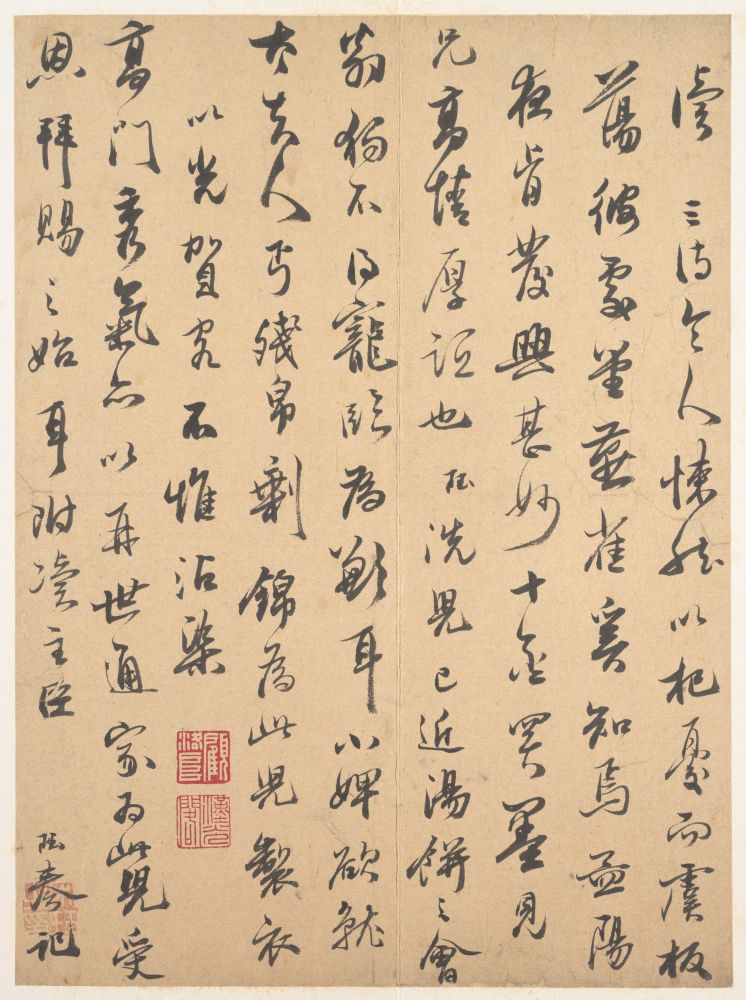“This exhibition will explore the twin themes of solitude and togetherness in Chinese art. For more than two thousand years, reclusion—removing oneself from society—has been presented as the ideal condition for mental cultivation and transcending worldly troubles. At the same time, communion with like-minded people has been celebrated as essential to the human experience. This choice, to be alone or to be together, has been central to the lives of thinkers and artists, and Chinese art abounds with images of figures who pursued both paths—as well as those who wove them together in complex and surprising ways. Companions in Solitude, presented in two rotations, will bring together more than 120 works of painting, calligraphy, and decorative arts that illuminate this choice—depictions of why and how people have sought space from the world or attempted to bridge the divide between themselves and others. In the wake of 2020, a year that has isolated us physically but connected us virtually in unprecedented ways, this exploration of premodern Chinese reclusion and communion will invite meditation on the fracture and facture of human connection in our own time.”
该展览凸显两个主题,一个隐居(reclusion),另一个是交往(communion)。纵观中国历史,平民子弟出入头地的主要出路,就是寒窗苦读,一旦金榜题名,便出仕摄政。文人也盼望在官场谋个一官半职,养家糊口不说,还可以施展自己的才华,实现自己的理想和抱负。同时,一些文人,受道家思想的影响,或官场失意,或看破红尘,选择逃避现实,归隐老家,甚至深山老林。千百年来,陶渊明的《归去来兮赋》最为人津津乐道。但即使隐居,也需要与志同道合之士交往,否则会彻底被人遗忘,所以第二个主题也很重要。
如果要翻译成中文的话,Companions in Solitude是否可以译成“隐士神交”。
该展览已于8月14日结束。本人没有、也没想去现场参观,一是懒惰,二是所有作品都在网上,而且配有高清大图,比现场还清楚。三是展品里没有特别有名的作品。
本人对书法情有独钟,在网上对每件书法作品都看了一遍。由于主题的限制,大都会博物馆藏品中一些很有名的中国书法作品,没有选入参展。其中最有名的,当属黄庭坚的草书巨作《廉颇蔺相如》。该幅作品气势磅礴,实乃黄庭坚草书的精品。但廉颇和蔺相如都混迹官场,为朝廷效力,companion 或许有,但没有 solitude,故不符合这次展览的主题,忍痛割爱,实属必然,但很可惜。
在这里,我挑了一幅书法作品与大家分享。这幅作品是宋珏的行书信札。
据百度百科,宋珏为风流才子,“书圣画禅”,其人品高洁,技艺超群,也自为当世士林所赏识。珏工八分书,行、章、草诸体亦佳,字字珠玑,笔法瘦劲有神,端庄凝重,浑然天成。
这幅信札写得非常优美,书风颇似赵孟頫。

大都会网站对此书法作品的介绍如下:
“Like the adjacent letter by Song Jue, this one mentions his friend Cheng Jiasui, another painter working in the Songjiang region, who apparently made a painting for the letter’s recipient. Song goes on to say that he is looking forward to showing off his newborn son and asks for some fine silks to have clothes made for the boy. ”
此外,网站还提供了信札的中文释文和英文翻译。
中文释文:
“續三詩,令人悚然,以杞憂而虞板蕩,彼處堂燕,雀奚知焉。孟陽夜肯發興甚妙,十金買墨,見兄高情厚誼也。玨洗兒已近湯餅之會,翁獨不得寵,臨為歉耳。小婢欲就太夫人丐殘帛剩錦,為此兒製衣,以光賀客,不惟沾染高門秀氣,亦以再世通家為此兒受恩拜賜之始耳。附凟主臣玨奏記。”
英文译文:
“….. It made me shudder with unnecessary worries over our declining nation. They are people in high places. What could a commoner [like me] know! Mengyang [Cheng Jiasui, 1565–1644] was willing to purchase very expensive ink to paint for you on a whim at night, which shows his lofty mind and deep affection. I am about to hold a birthday party for my son who is turning one month (or one year) old. Please forgive me that you alone have not doted on [met] him. I’d like to send a maid to your mother [wife?] for some leftover silk to make new clothes for my son to brighten up the occasion for the well-wishers. It will not only assume an air of elegance of your eminent family but also initiate the grace you will bestow on him to continue the tie between our two families. Submitted by Jue.”
英文译文开头的省略号不是我加的,我只是原样照搬。
如果没有释文和英文翻译,这封信札就如同天书,一般人读不懂。首先是认字。行草还好一些,如果是纯草体,那就更难认了。其次,即使每个字都认出来了,这些字堆放在一起,没有断句,没有标点符号,没有一定的古文底子,仍然看不懂。
欣赏书法之余,还顺便从信札中学了不少词汇,如“杞忧”、“板荡”、“堂燕”、“洗儿”和“汤饼之会”等。
发现了两处错误。其一,第一个字是“读”,不是“续”。草体的绞死旁不那么写,而言字旁可以。难怪开头三个字省略了没有翻译,因为“续三诗”不知所云。“读三诗”能说的通,这三诗具体指什么,只有写信者和收信人明白。
其二,“洗儿”和“汤饼之会”都是指新生婴儿三日庆生。据(明)程登吉《幼学琼林》第二卷:“三朝洗儿,曰汤饼之会;周岁试周,曰睟盘之期。” 但英文翻译误以为是满月(或周岁)。
落款中的“附凟主臣”尚没搞明白。
一个有趣的现象不得不提。在信札中,宋珏故意把自己的名字缩小,两个“珏”字,都特别小。这种自谦的做法相当普遍,赵孟頫在信札里就经常这样。不知这种做法是从何朝何代开始的。
最后,附上赵孟頫的行草书《惠竹帖》,该帖又称《明遠提舉帖》。一是可以比较一下宋珏和赵孟頫的书风。二是证实一下书者有意把自己的名字写小这一现象。

趙孟頫行草書冊頁《惠竹帖》(疑),又稱《明遠提舉帖》,元黃紙本,24×28厘米,台灣陳氏藏。《惠竹帖》爲緻明遠信劄,與《靜心帖》書風接近,且同收錄于《趙孟頫六帖冊》,故推測亦約作于江浙任上。
【釋文】
孟頫頓首。明遠提舉賢弟:達觀來,得所惠書,承惠竹,甚濟所乏,知感知感。香爐既不可得,且當置之。草草數字,具複,未既欲言。不宣。
三月八日,孟頫上覆。
2022年8月16日,匆匆




